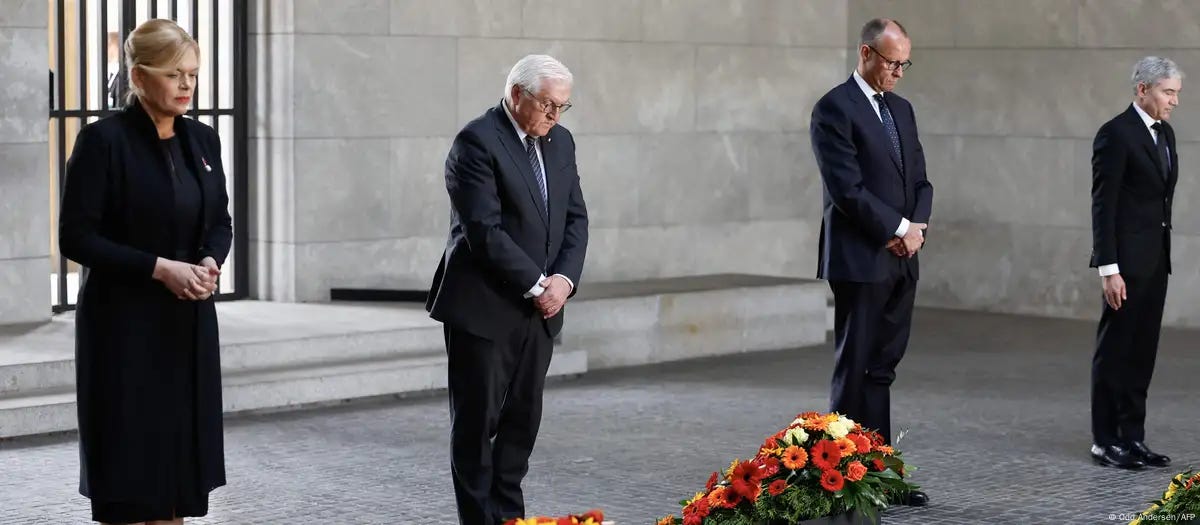I started this Substack a little over three months ago to work through William Shirer’s opus on Nazi Germany with the thought that it was important to get the details of the past down before we start talking about the present.
This week, Europe observes the 80th anniversary of the end of World War II.
It hasn’t been much in the news, what with—among other things—the election of the first American pope, trade deals, and potential war among nuclear powers in Kashmir.

The End of Memory
An 80th anniversary is a liminal observance.
There are still plenty of people out there who remember World War II. There are around 66,000 WWII veterans still alive in the United States. But anyone who participated in the events is extremely old. Almost all of those 66,000 have passed the centenary mark.
By the 100th anniversary of the war, they all will be dead, and living memory of the bloodiest war in history will be gone. Right now, though, it’s still out there, just dispersed—far from our political and media centers. In nursing homes or mother-in-law suites across the country, nurses check in on them or retirees take care of their even older parents, hearing ever so often a mention of their memories of the war, but then probably rarely.
As living memory fades into oblivion, history takes a more important role.
Its enemies are not just general forgetfulness, but also the manipulation of historical events for present political purposes. The most notable example, of course, is Vladimir Putin’s Russia, and the way the Victory Day events of May 9 (today) are used to rehabilitate Stalin and the Russian imperial project.
Between this Scylla of no memory and Charybdis of warped memory, the historian attempts to help us remember correctly the full range of details and their relation to one another.
That’s why it is so disheartening to see both the fields of journalism and history hit so hard in recent years. The institutions and practices that help us understand past events—whether distant or recent—are weak and failing.
And then pressures on the actual people who write those stories are such that they can’t follow the long-established rules that helped safeguard both fields. It can be extremely high teaching loads or excessive administration functions (both the results of cost-cutting efforts by bean-counting university administrators across the board) mean that the space to do good academic work is gradually crowded out.
And I don’t have to tell any of you about what the technological revolution has done to journalists and the time and space they need to produce their stories.
Shirer’s Career Route Is Gone
William Shirer is perhaps the best known writer about World War II, but as we observe this 80th anniversary, which got me to wondering what his career trajectory might look like today.
He might be able to exist today. Maybe.
But he would not have gone to Coe College in Iowa. He probably would have attended Harvard, NYU, Columbia, or Northwestern. And he wouldn’t have started at a small paper in Des Moines but started directly at the New York Times.
He also probably would have had European parents and spoke multiple languages at home. Otherwise, he would not have been able to get a leg up on the competition in college or for internships. And without a solid linguistic, cultural, and educational background from a young age, he would not have been able to get a foreign correspondent job straight out of college.
These days, there is no working your way across the Atlantic on a cattle boat and then dropping in on a newsroom in Paris to get a job.
Because of the money and connections required to get started on that track, it is almost certain that a William Shirer today would not be from a middle or lower classes, and probably not from the Midwest either (or even the South or West). He would probably be the child of a jet-setting, multicultural parents, who split time between Paris and New York or Berlin and New York. Maybe London and Vienna.
There are consequences of this development that affect their journalism.
To get a book advance or a research grant to actually fund the research of a book like The Rise and Fall of Third Reich would be almost impossible. The best scholars might get a paid year of sabbatical. Journalists also might get a grant for a year, maybe two. But not the time required to sift through papers for several years as a full-time job. That is impossible. It just costs too much. No one wants to bear the risk.
And risk it is.
We as a society regularly fund things like education and research that doesn’t seem to add anything to the bottom line, maybe even takes away some. But we do it because it is an investment in our society that will pay off in intangible ways as well as tangible ways.
But when a publisher can’t make money off of a 1200-page book (even if it is a bestseller), well then that risk doesn’t look like it is worth it.
But, of course, it is.
It’s just very hard to explain the value to some people. It’s hard to articulate the actual reasons we need detailed, thoughtful accounts of past events.
So that then is the challenge before us. And that is what we should think of as we remember the 80th anniversary of World War II this week.



